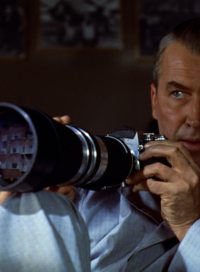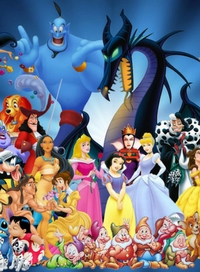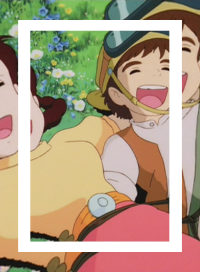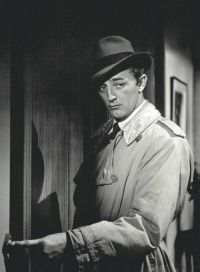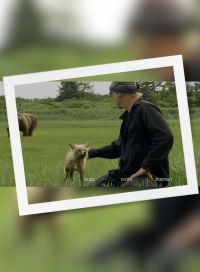Film Studies
Questions?
Program DirectorDr. Michael Raine
mraine3@uwo.ca
519.661.2111 x87895
Arts & Humanities Academic Counselling
arts@uwo.ca
519.661.3043
Film Studies Courses
featured courses
See Western Academic Timetable for course delivery details.
FALL/WINTER 2025-26 COURSES (SUBJECT TO CHANGE)
1000 Level Courses
1022 - Introduction to Film Studies POPULAR!
What is a blockbuster? What is a cult film? What is digital cinema? Discover the answers to these questions and others in a broad introduction to the study of cinema. Students will learn the basic vocabulary of film studies and gain an informed understanding of the different critical approaches to film analysis. 1.0 course
| Fall/Winter | 1022 / 001 | J. Wlodarz | Syllabus |
| Fall/Winter | 1022 / 002 | M. Raine | Syllabus |
2000 Level Courses
2159A/B - Disney (Disney Dream Factory) POPULAR!
Benjamin Barber in The New York Times argued “whether Disney knows it or not, it is buying much more than our leisure time. It has a purchase on our values, on how we feel and think, and what we think about.” This course offers a closer look at Disney as one of America's most long-standing “dream factories,” examining the cultural narratives, industrial strategies, fantasies and ideologies that fuel Disney’s global impact in the 20th and 21st century. In addition to analyzing key Disney animated features, we will also look at the studio’s early cartoons, educational and advertising films, nature documentaries, live action films and propaganda shorts. We will study Disney’s relationship to art, politics and ecology and also examine the “invention” of childhood, notions of “family” entertainment and constructions of race, class and gender in Disney filmmaking. Films might include Bambi, Sleeping Beauty, Tron, Snow White and the Seven Dwarfs, Song of the South, Steamboat Willy, Fantasia, The Lion King and Frozen. 0.5 course
| Fall 2025 | 2159A / 650 (Online) | J. Blankenship | Syllabus |
| Winter 2026 | 2159B / 001 | T. Tomko | Syllabus |
2164B - Animation/Anime
This course explores the power of animation, with a particular emphasis on Japan. Students will study Japanese anime films and multimedia franchises as artistic expressions, as industrial products with relations to other cultural forms, and as objects through which consumers construct their social lives. This is a non-essay course, so the emphasis is on hands-on group work (analyzing images, putting together a sequence, researching anime's "media mix"), as well as regular forum posts and a final examination. The emphasis is on my own "otaku 1.0" history – science fiction, posthumanism, and apocalypse – but you will also have the opportunity to discuss your favorite contemporary animation. No prior knowledge of Japanese is required. 0.5 course
| Winter 2026 | 2164B / 001 | E. Paauw | Syllabus |
2191G - Special Topics in Film Studies: Bollywood Cinema
Bollywood, the mainstream Hindi-language film industry in India, is regarded as one of the world's largest and most prolific film industries. In this course, we aim to look at narratives in 21st century Bollywood films which dismantle and interrogate mainstream representations of India. In analyzing representations of gender, religion, caste, class, the diaspora, and the nation, we will understand the role that mainstream Hindi cinema plays in nation-building and identity-formation. In doing so, we will also examine the contestations that surround the term, "Bollywood," and how 'Bollywood' is desired by re-making India in the Western and diasporic imaginations. 0.5 course
| Winter 2026 | 2191G / 001 | A. Dutta | Syllabus |
2198A - Special Topics in Film Studies: Ancient Greeks on Film (cross-listed with Classics 2810A)
This course introduces students to epic films set in ancient Greece. In addition to detailed discussions of individual films, topics covered will include: how and why events are selected and portrayed in film; the differences between history and Hollywood mythology, history and fiction; how the portrayal of cinematic Greece has changed over time; and conventions of the Greek epic and the use of spectacle and hyperbole. 0.5 course
| Fall 2025 | 2198A / 001 | K. Olson | Syllabus |
2212F - Adapting across Page, Stage, and Screen (cross-listed with English 2112F and Theatre Studies 2212F)
How does the shape an artwork takes contribute to its aesthetic and political power? When artworks flex across form and media how do their messages change? What did Marshall McLuhan mean when he said “the medium is the message”? How do genre and form shape social and political discourse? In this course, students explore these questions and more as they investigate texts that assume multiple cultural forms and represent a diversity of perspectives. 0.5 course
| Fall 2025 | 2212F / 001 | B. Diemert | Syllabus |
2230F - Critical Reading and Writing in Film Studies
This course will build on skills and knowledge acquired in Film 1022 to engage students in the critical practices involved in reading various genres of writing in Film Studies. In addition to writing their own film reviews, students will learn research skills that prepare them for writing critical essays on cinema. 0.5 course
| Fall 2025 | 2230F / 001 | T. Nagl | Syllabus |
2254F - Classical Hollywood Cinema
This course traces a history of American film from the silent period to the end of the studio era. Topics include the establishment of the Hollywood style, major directors/genres, as well as key industrial, technological, and cultural factors in the development of Hollywood cinema. 0.5 course
| Fall 2025 | 2254F / 001 | J. Wlodarz | Syllabus |
2258G - Canadian Cinema: Documents, Storytelling, Experiments
This course looks at Canadian cinema in relation to the category label, national cinema. What is the value of a national cinema? What is the popular imagination? How do the films speak to us about Canada, its history, its people and its politics? 0.5 course
| Winter 2026 | 2258G / 001 | T. McDonald | Syllabus |
CANCELLED 2259G - Indigenous Cinema
Indigenous Cinema has been creating Visual Sovereignty, resisting colonialism, revealing strategies for survival, and carving out a space in global cinema to speak to other Indigenous viewers and find the similarities between us. In this course we will reflect on Indigenous representations from outsiders, and the subsequent development of Indigenous Cinema by Indigenous people around the world. Through screenings, readings, discussions, and writing assignments, the students will gain an understanding of the unique histories and films of Indigenous people from North and South America, Australia, New Zealand, and Northern Europe. By the end of this course students will be able to articulate the similar ways colonization has affected Indigenous people, and the unique ways Indigenous filmmakers represent resistance, resurgence and resilience. 0.5 course
| Winter 2026 | 2259G / 001 | Instructor: tba | Syllabus |
3000 Level Courses
3311F - Special Topics in Film Studies: Pop.Sound.Cinema.
This course explores the history, technology and aesthetics of popular music and the moving image, tracing their convergence and synchronization from early cinema to the digital music video. Topics may include: the concert film, pop art and pop music, New Hollywood and the soundtrack, sound theory, the rise and fall of MTV, the avant-garde and visual music, the pop star on screen, the body in motion, afrofuturism. 0.5 course
| Fall 2025 | 3311F / 001 | T. Nagl | Syllabus |
3312F - Special Topics in Film Studies: Art and Mass Media (cross-listed with AH 2662F)
This asynchronous online course examines the complex relationships that have emerged since the mid-twentieth century between art and the mass media, particularly film and television. We will begin with an exploration of the theoretical discourses that help us analyze and contextualize image-making practices. Then, we consider the collaborations and conflicts that have marked the intersections between the art world and the worlds of cinema and television. Specifically, we will focus on how artists have engaged with the content and institutional structures of the mass media as well as how the mass media has represented, and responded to, artists and the art world. This course is lecture-driven. There is no final exam. 0.5 course
| Fall 2025 | 3312F / 650 (Online) | C. Sprengler | Syllabus |
CANCELLED 3316F - Special Topics in Film Studies: Film Festivals: Local and Global (cross-listed with ICC 3200F)
This course looks at the film festival as a complex and dynamic phenomenon, the study of which has been addressed from a wide range of disciplinary approaches: from film studies to geography, from anthropology to global studies. Its aim is to critically reflect on festivals, as well as on the international film festival circuit, understood as spaces in which symbolic negotiations between the local and the global take place, alternatively fostering, challenging or reproducing other forms of cultural exchange and commercial interactions. 0.5 course
| Fall 2025 | 3316F / 001 | C. Burucua | Syllabus |
3335G - Contemporary German Cinema (cross-listed with German 2261G)
This course introduces students to Contemporary German Cinema after unification. Topics include the "Berlin School" and transnational film production, Ostalgie, European identity, migration, and historical memory. The relationship to the auteurism of post-war New German Cinema will also be examined. 0.5 course
| Winter 2026 | 3335G / 001 | T. McDonald | Syllabus |
3340G - Japanese National Cinema
A survey of Japanese cinema from its prehistory to the work of contemporary transnational auteurs. Students will study films in their historical and aesthetic contexts, and in relation to specific topics in film studies. For example: traditional aesthetics; the war film and propaganda; postwar melodrama; J-Horror; and anime. All readings are in English; no Japanese is required. 0.5 course
| Winter 2026 | 3340G / 001 | M. Raine | Syllabus |
3352G - Queer Cinema (cross-listed with GSWS 3333G)
This course will explore the history, politics, and aesthetics of queer film, particularly the representation of queer culture and identity as well as the policing of non-normative sexualities. Course topics may include: Hollywood and the Celluloid Closet, queer independent cinema, and transgender film. 0.5 course
| Winter 2026 | 3352G / 001 | J. Wlodarz | Syllabus |
3357G - Science Fiction Cinema
This course explores the history and development of Science Fiction cinema from the silent period to today’s CGI-saturated spectacles. Major themes include: the aesthetics of science fiction, modernity and social change, utopias/dystopias, technophobia/technophilia, identity/otherness, biopolitics, afrofuturism, set design, special effects and the "cinema of attractions". 0.5 course
| Winter 2026 | 3357G / 001 | T. Nagl | Syllabus |
CANCELLED 3360G - Topics in Film Genre: Medical Drama
This course will explore the exciting intersection of medicine and the movies. Larger themes include the medical bodyscape and biotourism, medical discourse and discrimination, medical visualization/imaging, and contagion. We will examine a variety of medical sub-genres including the medical drama, medical soap, bio-medical thriller, and medical sci-fi, and also take a closer look at live-action shorts and animated public health films. Films and TV shows include: Emergency! (1972-79), Miracles in Modern Medicine (surrealist film that debuted at the Montreal cinema expo ‘67) , Fantastic Voyage (1966), Gattaca (1997). Contagion (2011) and Osmosis Jones (2001). 0.5 course
| Winter 2026 | 3360G / 001 | J. Blankenship | Syllabus |
3366F - Film Noir and the Crime Genre
David Lynch once said that film noir is "a mood that everyone can feel. It’s people in trouble, at night, with a little bit of wind and the right kind of music. It’s a beautiful thing." "Noir" is one of the most notoriously contentious film categories: is it a genre, a film style, a period, an aesthetic, a mood, a psychology, a philosophy, an associated set of themes, icons, character types, and/or narrative conventions? Film noir emerged as an identifiable phenomenon in the United States in the 1940s and continues to influence contemporary culture, from film and video to fashion, music, advertising, and social media. Our class will consider the history of film noir from the 1940s to the present, its distinctive representations of crime, the law, racial issues, ideas about masculinity and femininity, and the impact of American consumer culture. We will explore film noir through a variety of critical lenses, considering both classical exemplars and revisionist approaches to noir. 0.5 course
| Fall 2025 | 3366F / 001 | M. Jones | Syllabus |
3368F - Film Production
This course will explore the stylistic functions of basic film elements, e.g., camera movement, editing, sound, and colour, through the analysis and production of films. You will practice storytelling skills and evaluate various AI-powered script generation tools and platforms available, considering factors such as ease of use, customization options, and output quality.
Students will work through a series of collaborative studio projects aimed at developing knowledge and technical proficiency regarding: pre-production planning and scriptwriting, composition and visual communication, manual camera control, colour grading, lighting, audio recording and sound design, as well as editing and stylization in post-production.
Studio production and experimentation will be complemented by online technical demonstrations, lectures, readings, discussions, and viewings aimed at developing critical response skills, conceptual foundations, and language appropriate for image evaluation and analysis. These will provide students with versatile tools and approaches through which ideas about filmmaking may be explored, and developed, culminating in a video production project. Remote production techniques related to the pandemic will be explored if necessary. No prior experience with digital technology and/or video production is required. 0.5 course
| Fall 2025 | 3368F / 001 | G. De Souza | Syllabus |
3371G - Film Theory
This course will investigate major writings in two areas of classical film theory: the realism-formalism debate and the auteur theory. Additional topics in film poetics and semiotics will also be discussed. 0.5 course
| Winter 2026 | 3371G / 001 | T. Nagl | Syllabus |
3374F - Documentary Film
This course will introduce students to the history and theory of documentary cinema from the earliest actualities of the 1890s to the present. We will consider how the documentary film developed as an aesthetic form and a mode of cultural expression and also trace the impact of technological changes in reshaping documentary film practice. Topics include the Lumière Brothers and early actualities, Robert Flaherty and the ethnographic gaze, montage and the city symphony, documentary portraits, the poetic documentary/essay film, Direct Cinema, cinéma vérité, Michael Moore, the postmodern “mockumentary,” the digital image and documentary ethics. 0.5 course
| Fall 2025 | 3374F / 001 | J. Blankenship | Syllabus |
4000 Level Courses
4409E - Undergraduate Thesis
Individual instruction in the selection of a topic, the preparation of materials, and the writing of a thesis. Students who wish to take this course must apply to the Program Director. The course is restricted to students in fourth year of an Honours Specialization in Film Studies. 1.0 course
| Fall/Winter | 4409E / 001 | Various | Consent Form / Evaluation Form |
4495F/G - Film Academic Internship
Third or fourth year students enrolled in an honours, major or specialization in Film Studies, who have a modular average of 75% are eligible for an internship within an approved media-related organization. The student must find a faculty supervisor willing to oversee and grade his/her final paper. 0.5 course
| Fall/Winter | 4495FG / 001 | Various | Internship Guidelines |
Course listings are subject to change. See Western Academic Timetable for date, time, and location of specific courses. See Undergraduate Sessional Dates for more details and deadlines.

